Brian Clegg's Blog, page 94
June 19, 2014
SageOne revisited
 A while ago I blogged about the accounting software Sage One - I've now been using it a couple of years, so thought it was a good point to revisit it and weigh up the pros and cons as a battle-hardened user. If you're wondering what accounting software has to do with the life of a science writer, one of the joys of being a freelance is you have keep your accounts in order to minimise payments to expensive professionals. There's no such thing as a free accountant.
A while ago I blogged about the accounting software Sage One - I've now been using it a couple of years, so thought it was a good point to revisit it and weigh up the pros and cons as a battle-hardened user. If you're wondering what accounting software has to do with the life of a science writer, one of the joys of being a freelance is you have keep your accounts in order to minimise payments to expensive professionals. There's no such thing as a free accountant.This is online accounting software that keeps your books in order, does VAT invoices and other such goodies (in fact it even produces your VAT return and can submit it directly to HMRandC). If your accountant is into such things, they can get access to your accounts with extra accountant-flavour handles and help prepare you accounts more easily. My accountant has reduced my annual big bill for doing the year end accounts by around twice the £120+VAT a year I pay for using Sage.
Obviously that payment is the biggest downside. There are also one or two interface aspects that could be handled better. When you go into the site, which I probably do twice a day on average, you go to a screen where you can choose 'Accounts' or 'Collaborate'. I have never chosen 'Collaborate' so waste a few seconds every time clicking through to the obvious destination. Another oddity is that Sage's own invoices are accessed via the Settings menu, and don't automatically feed through to your accounts: you have to add them manually. (I've moaned about this and they've promised to look into it.)
But set against that, it is very easy to do all the basics like enter sales and purchases, enter payments, reconcile against bank accounts and so on. I check my business bank account every morning and simply add in any new transactions, so my accounts always match the bank figures. At the end of the month I do a formal reconcile, ticking off all the transactions against the bank statement and filing the associated paperwork. This is quick and easy. The result is, when I come to my quarterly VAT return literally all I do is a couple of clicks and my VAT return is done.
I wouldn't go so far as to say this makes accounting fun, though if you enjoy a good completed list of tick boxes, there is a type of pleasure in reconciliation. But it certainly makes this essential relatively painless. And because it's a web-based system, I can access it from any computer (or even my iPad) wherever I am.
We're all good at moaning about products that let us down, but I've genuinely been really pleased with Sage One. It's hugely more friendly and approachable than heavy duty accounts software, like the full blown Sage. If you have to do accounts, they have a free trial, so I'd recommend taking a look. (I use the basic Accounts, rather than Accounts Extra, which is for more complex businesses. They also have Payroll etc, but I've never tried that, so can't comment on how good it is.)
Published on June 19, 2014 02:28
June 18, 2014
Improbable things happen all the time
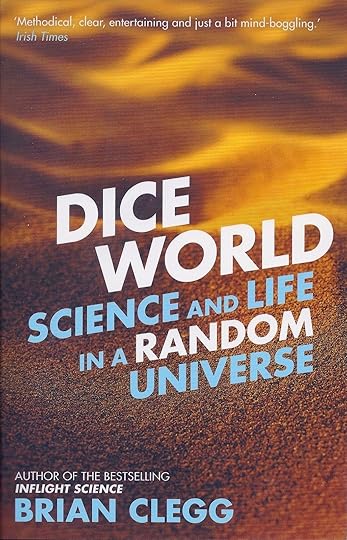 One of the reasons I'm so pleased my book Dice World has been longlisted for the Royal Society Prize is that it covers probability, and we humans are terrible at getting the hang of probability - yet it comes into our lives very frequently. A great example is the way that we tend to assume that if something happens that is highly improbable there has to be something suspicious about it - but highly improbable things happen all the time.
One of the reasons I'm so pleased my book Dice World has been longlisted for the Royal Society Prize is that it covers probability, and we humans are terrible at getting the hang of probability - yet it comes into our lives very frequently. A great example is the way that we tend to assume that if something happens that is highly improbable there has to be something suspicious about it - but highly improbable things happen all the time.This weekend, for instance, was the culmination of an event so improbable that the chances against it happening were around 1.6 x 10743 to 1 (where 10743 is 1 followed by 743 zeroes). That is, frankly, the sort of event that clearly will never happen. Just to put it into context, the estimated age of the universe in seconds is just 4.32 × 1017 seconds. Yet that event did happen. What was it? That's the chances that the particular set of winning numbers over the last year in the UK National Lottery would be drawn.
Unfortunately we have so much trouble understanding probability, and particularly unlikely events like this, that it has caused real problems, including miscarriages of justice when people have been convicted of a crime because it appeared very unlikely that the event would happen by accident.
When faced with a very unlikely event there are (at least) three key tests it's worth applying:
1) Are the sub-events independent? That big number above was produced by multiplying the chances of a particular number winning one week by itself 104 times. This procedure only works if the events we are combining are independent. In this case they are - there is no connection between what is drawn one week and the next, which means that probability figure is genuine. In other cases though, you can't just combine probabilities this way. For example, in the infamous trial where Sally Clark was convicted of killing two babies who apparently died of cot death, the 'expert' witness Sir Roy Meadow took the chances of one cot death, 1 in 8,543 and multiplied it by itself to get the chances of two deaths as 1 in 73 million. But this would only be true if the two events were independent. But the babies shared an environment and genes, both of which influences the chances of the tragic event happening again. The events weren't independent.
2) What are the chances of something of this sort happening? We've seen that the chances of the particular set of numbers coming up in the lottery draw over the year is ludicrously small. But we should also ask what is the chance that any 104 numbers would be drawn. That is very close to 1 - unless there was a technical problem that prevented the drawn happening, it's a certainty. So unless we have a particular reason for expecting a certain set of numbers, the probability of the specific set drawn is almost irrelevant. It is almost certain that 104 numbers, each with a probability of about 14 million to one would be drawn - this just happens to be the particular set that turned up. You can see this around you all the time. Next time you are on a busy road, look at the number plate of the next car that passes you. What's the chances it would be that car? Pretty small. But is this remarkable? Hardly.
3) What are the chances of causes other than those that are being suggested? We are pretty sure that the lottery draw was due to random selection, because the draws are from well-designed machines, which are well protected against fraud. The chances of this set of numbers being drawn because it was rigged for them to occur is small. This probably isn't a very important consideration in the lottery. However, it is significant in the Sally Clark case. Just because something is low probability doesn't mean it has a particular cause. In the trial it was assumed that because the chance of the event happening due to cot death was low, this implied that the probability of the babies being intentionally killed by Clark was high. But it's not either/or. In that circumstance, what should have been done is comparing the chances of the babies dying through cot death with the chances of the deaths occurring as a result of murderous action by Clark. I don't have the specific figures, but I suspect the chances of a mother committing a double child murder are significantly lower than the chances of this happening through cot death.
So, while very low probabilities may seem on first sight to make an event suspicious, make sure you use your mental toolkit to test the circumstances before leaping to a conclusion.
Published on June 18, 2014 01:08
June 17, 2014
How not to do a Turing test
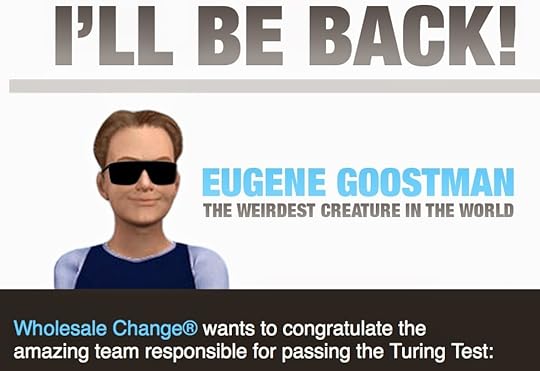 The idiot news people (sorry BBC) made a splash recently by claiming that a computer had successfully passed the Turing test. This is an idea modified from an article by the great Alan Turing, who suggested that a good test of artificial intelligence is to communicate with the computer down the wire and if you can't tell whether it's human or computer, then it passes - you have AI. (Turing's original concept is actually significantly more confusing, but this is the version usually given.)
The idiot news people (sorry BBC) made a splash recently by claiming that a computer had successfully passed the Turing test. This is an idea modified from an article by the great Alan Turing, who suggested that a good test of artificial intelligence is to communicate with the computer down the wire and if you can't tell whether it's human or computer, then it passes - you have AI. (Turing's original concept is actually significantly more confusing, but this is the version usually given.)There are several problems with this story. One is that the test as described is far too easy to pass. All that is required is that the machine is 'mistaken for a human more than 30% of the time during a series of five minute keyboard conversations.' That's a pretty low pass rate. I don't think you even get a GCSE for a 30% success. (Turing actually asked 'Will the interrogator decide wrongly as often when the game is played like this as he does when the game is played between a man and a woman?' - in his version the computer was rather oddly compared with two human, one who always tells the truth and one who doesn't.) Apparently the chatbot 'Eugene Goostman' convinced 33% of the judges that it was human, therefore the organisers claim a success. What we aren't told is how many judges there are - if there were only 3, we are talking about one person being convinced - hardly impressive.
Frankly this test at Reading University was a farce, and it's very sad that some academics enthused over the success the way they did (and that the Princeton web page portrayed above seems to think it was a success). The fact is, you only had to spend the requisite five minutes with Eugene and you would know perfectly well that 'he' is a program. Interestingly, the team behind Goostman have taken the chatbot down, probably due to the hilarity of those trying it out and discovering just how bad it is. (It should be here.) But even the simplest of tactics - asking the bot what a word the bot itself had used meant - showed it up as a failure. It couldn't explain the meaning of a single word it used. A 13-year-old Ukrainian speaking a second language, as Eugene is supposed to be, might not give good dictionary definitions, but could and would have a stab at this. And there are lots of other easy conversational ploys that the chatbot failed on.
If you would like a go at a very early chatbot that was also briefly claimed to have passed the Turing test, take a look at the grandmother of them all, Eliza.
I leave the final word with Dean Burnett, who claimed in a Guardian article that an actual 13-year-old boy had passed the Turing test and was declared human. Now that, surely, is impossible.
Published on June 17, 2014 00:37
June 16, 2014
Timeswitch review
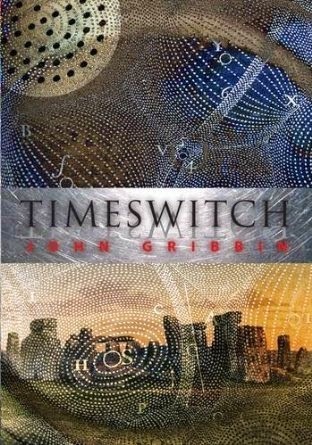 This is one of the best science fiction books I've read in ages - it could have been written for me, combining as it does hard science, an element of historical fiction and some mind-boggling twists. It even nearly achieves something that had seemed impossible.
This is one of the best science fiction books I've read in ages - it could have been written for me, combining as it does hard science, an element of historical fiction and some mind-boggling twists. It even nearly achieves something that had seemed impossible.John Gribbin is one of the UK's top writers of popular science books, but he proves here that he can put his hand to fiction writing with masterful ease. In Timeswitch, a device is discovered under Stonehenge that provides a wormhole style portal into the past. But it can only achieve jumps in units of 300 years, and the further back you go, the less time you have in the place you visit before you are dragged back to the present. The book's present is an alternative world, where scientific discoveries were made much earlier than in our reality (Galileo comes up with special relativity, for instance), as a result of which we were hit by global warming much earlier and the present is almost uninhabitable. The scientists working on the portal try to use it to change the past and save the environment with fascinating consequences.
There were so many things I liked here. It was well written and kept me pushing on to discover more. The way Gribbin handles the possibility that changing the past might result in different futures and hence different versions of the time travellers is brilliant - reminiscent of the multi-layered delights of one of my favourite films, Inception (this would make a great movie or TV series). The historical periods are well conceived and I was impressed with way the author plays with the different people in the past to construct a new history of science.
That's where the 'nearly achieves something that had seemed impossible' comes in. I have always thought that it should be possible to write a good piece of fiction that also gets across some real science in an effective way. This is by far the best book I've ever seen for doing this - with the only problem that the terminology used is not the ones we use, and the historical context, so important in popular science, is here all fictional.
However, this doesn't stop the book being a superb piece of science fiction (with historical fiction touches). And even when you think you can see what's coming, there's a clever twist that changes things entirely. If I have any complaint it's only that I suspect in a real alternative history like this far fewer of the familiar names would crop up in science, because modern physics has got so mathematical that most of great physicists in history simply couldn't handle it. I'm thinking particularly of Cavendish, who is given an important place in developing advanced physics, but as far as I'm aware had no mathematical ability. It's a minor niggle that wouldn't bother anyone who wasn't a popular science or history of science nerd.
All in all a delight. Available in paperback and ebook from Amazon.co.uk and Amazon.com (and all good bookshops).
Published on June 16, 2014 00:58
June 13, 2014
Royal Society Winton Prize for Science Books Longlist
 I've always been a great supporter of the Royal Society's prize for science books, and list the details on popularscience.co.uk, but for reasons that may become obvious, I thought I'd post the announcement of the books on the longlist today.
I've always been a great supporter of the Royal Society's prize for science books, and list the details on popularscience.co.uk, but for reasons that may become obvious, I thought I'd post the announcement of the books on the longlist today.The longlist for this year’s Royal Society Winton Prize for Science Books – the world’s most prestigious award for popular science writing – is announced today (13 June).
The judges selected a longlist of twelve books:
Serving the Reich: The Struggle for the Soul of Physics under Hitler by Philip Ball(The Bodley Head)The judges said: “An incredibly interesting look at the politics of science and the decisions all scientists have to make.”
Seven Elements That Have Changed The World: Iron, Carbon, Gold, Silver, Uranium, Titanium, Silicon by John Browne(Weidenfeld & Nicolson - an imprint of the Orion Publishing Group)The judges said: “An inspired look at seven very special elements which are essential to the modern world. It’s a captivating read.”
Tesla: Inventor of the Electrical Age by W. Bernard Carlson(Princeton University Press)The judges said: “Full of lots of new messages, Carlson makes you stop and think about the practicalities of science, industry and invention.”
What a Wonderful World: One Man’s Attempt to Explain the Big Stuff by Marcus Chown(Faber & Faber)The judges said: “Chown is a terrific science writer. His book is a tour de force that covers an incredible range of topics.”
Dice World: Science and Life in a Random Universe by Brian Clegg(Icon Books)The judges said: “A fantastic look at the importance of randomness, full of interesting and philosophical ideas while still remaining open and accessible.”
The Compatibility Gene by Daniel M Davis(Allen Lane, Penguin Press)The judges said: “Davis wins you over from the start with touch points you can relate to and engaging descriptions. Dedication and a life spent in pursuit of his subject are evident on every page.”
My Brief History by Stephen Hawking(Transworld)The judges said: “Hawking writes incredibly poetically, conjuring evocative images in your mind. My Brief History takes you on a journey of adversities and shows you what has made Hawking one of the most respected theoretical physicists in the world today.”
The Perfect Theory by Pedro G. Ferreira(Little, Brown Book Group)The judges said: “Very lucidly written, Ferreira succeeds in a explaining some very tricky concepts. A treasure trove of information.”
The Cancer Chronicles: Unlocking Medicine’s Deepest Mystery , by George Johnson(The Bodley Head)The judges said: “A scrupulously researched, well written book that makes excellent use of case studies.”
Paleofantasy: What Evolution Really Tells Us about Sex, Diet, and How We Live by Marlene Luk(W.W. Norton)The judges said: “Paleofantasy presents an interesting thesis that feels fresh in a very accessible way. The book represents an argument against the accepted wisdom of our time.”
Stuff Matters: The Strange Stories of the Marvellous Materials that Shape Our Man-made World by Mark Miodownik(Viking – an imprint of Penguin Books)The judges said: “A contemporary, sideways look at everyday stuff. Miodownik writes with a passionate ability to explain each subject. It’s packed full of excellent stories and is the only science book out there where the author gets stabbed on the London Underground!”
Gulp: Adventures of the Alimentary Canel by Mary Roach(Oneworld)The judges said: “An entertaining and disarming read which delves into a usually unspeakable topic with great humour and great insight.”
Professor Nicky Clayton FRS, Chair of the judges, said:
“Choosing just 12 books from the over 160 that were submitted for this year’s Prize was a very difficult task. There really is a plethora of good science writing out there at the moment. I think this shows how science is ever increasingly becoming part of our culture. In the end though, we did have to agree on 12 and we’re delighted with those we’ve selected. Each one takes you on an informative but perhaps more importantly, engaging, journey of the science. Some are woven with humour and passionate personal stories; others are able to illuminate incredibly complex topics. All are marvellously written and full of the wonder of science.”
The shortlist will be announced on 19th September 2014.
The judges on this year’s judging panel are: Professor Nicola Clayton FRS (Chair), Professor of Comparative Cognition at the University of Cambridge and Scientist in Residence at Rambert (formerly Rambert Dance Company); Dr Nathalie Vriend, Royal Society Dorothy Hodgkin Fellow, Department of Applied Mathematics and Theoretical Physics, University of Cambridge; Emma Read, Head of Factual and Features at ITN Productions; Michael Frayn, playwright and novelist, best known as the author of the farce Noises Off and the dramas Copenhagen and Democracy; Lone Frank, former neuroscientist, journalist and author of My Beautiful Genome, shortlisted for the 2012 Royal Society Winton Prize for Science Books.
Published on June 13, 2014 00:18
June 12, 2014
The trouble with religious books
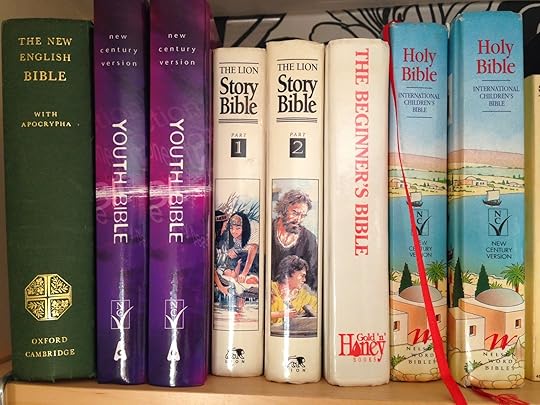 There has been a lot of discussion in the media recently about what in schools is 'conservative religious practice' and what constitutes extremism. I'd suggest there are (at least) two problems here that I haven't heard mentioned. One is that, while a tolerant, open society should of course allow people to undertake 'conservative religious practice' themselves, this is not a licence to impose it on others of the same faith, different faith or no faith at all. While a school should not prevent an individual from undertaking 'conservative religious practice' as long as it doesn't interfere with the teaching activities of the school, it shouldn't be allowed to impose these practices as a standard, whether it is a faith school or not (I personally think we should get rid of faith schools, but that's a different issue).
There has been a lot of discussion in the media recently about what in schools is 'conservative religious practice' and what constitutes extremism. I'd suggest there are (at least) two problems here that I haven't heard mentioned. One is that, while a tolerant, open society should of course allow people to undertake 'conservative religious practice' themselves, this is not a licence to impose it on others of the same faith, different faith or no faith at all. While a school should not prevent an individual from undertaking 'conservative religious practice' as long as it doesn't interfere with the teaching activities of the school, it shouldn't be allowed to impose these practices as a standard, whether it is a faith school or not (I personally think we should get rid of faith schools, but that's a different issue).However, what I wanted to think about today, was a second potential problem, and that is the way that some religions use specific religious texts to justify behaviour and the imposition of that behaviour on others.
The reason I think this is a problem is that there are four different ways to interpret these books, each with some issues attached, each taken by different parts of the inhabitants of the UK, and so having a significant potential to cause problems. In describing these ways, I am using the bible as an example, as it is the religious text I know best.
Level 1 - There's some good writing in there and these are interesting historical texts. This is, if you like, the Dawkins position. In the bible, for instance, there is some rather beautiful poetry and powerful use of language, particularly in the Authorised Version. And the bible is an extremely valuable document for getting a better feel for attitudes to the events it describes at different times in history. However, it can only be regarded as a work of fiction and propaganda, so certainly should have no influence on anything we do today. In the same sense 'interesting historical texts' means that these texts were written a long time ago - they have very little bearing on actual history.
Level 2 - There are some words of wisdom, though we don't accept the basic religious tenets. This is the 'let's pick the good bits' approach. It isn't interested in the religious content per se, but accepts that, for instance, the gospels provide all sorts of advice for good living, treating others as we should and so forth. It's using the bible a bit like one of those 'how to win friends and influence people' type books.
Level 3 - We accept the core religious tenets, but the bible is an amalgam of texts which shouldn't all be given the same weight. This, I would suggest, is the attitude of the majority of those practising a book-centred religious belief. In terms of the bible, it says, for instance 'I accept Jesus' role as son of god, sent to save us', but is happy to pick and choose those bits that it is felt are acceptable. So, for instance, such a view doesn't require the story of creation in Genesis to be literal. It doesn't take it as literal when we hear that Jesus 'cast demons out' - this is just taken as a pre-scientific interpretation of mental illness. And this viewpoint is happy to ignore those aspects of the book - for instance, the more blood-thirsty and unpleasant rules in the Old Testament, or when St Paul says 'women should not address the meeting. They have no licence to speak, but should keep their place as the law directs. If there is something they want to know, they can ask their own husbands at home.' Ah, that's just Paul (or quite possibly whoever added it long after Paul wrote the epistle) expressing the social attitudes of the time, they say. This is fine, but as soon as you do this, you are in no position to make any restrictions on other people based on what the bible says. If you believe there is room to dismiss aspects of the book, you can't prevent anything because it is 'against your religion' or 'not appropriate for our religious practice.'
Level 4 - the bible is to be accepted word for word and is the inerrant word of god. This is the view we would typically describe as fundamentalist and leads to creationism and various other outcomes. The problem with this view is that the bible is a collection of texts from different periods and suffers as a result from both inconsistencies between books, and also in some cases inconsistencies within books. So, for instance, the first two chapters of Genesis contain two different creation stories (generally considered to have come from two separate older cultures) which are incompatible. If you take these as parables, putting god and religion into context, that incompatibility is not a problem - but if you consider it literally true, there is nowhere logical to go. Similarly, in the New Testament, the gospels are not consistent in what happened where in what time order. Again, fine if you take them as attempts to make specific points, but not as literally true historical documents. And once you get onto the epistles, there is plenty of inconsistency, because they are instructions from a series of very different church leaders.
Not one of these levels gives us a basis for imposing religious rules and behaviours on others. The first two levels wouldn't even attempt it. Level 3 only attempts in in the areas it agrees with - which is hypocritical, as level 3 supporters are happy to ignore those aspects that they consider to be outdated, but are still trying to impose the rest on others. Where is the 'authority' for that specific division? In once sense, level 4 supporters do seem to have a basis for imposing their religious view. If they genuinely believe in the absolute truth of every word of the book, then you can see why they might try to impose it. But here the problem is that they are basing their imposition on something that is inconsistent. And as soon as you do that, you lose any right to do so - if it were taken before a court of law you would be pulled to shreds by the opposition.
So, I would suggest, there can never be an acceptable basis for imposing religious rules and behaviours on anyone other than yourself.
Published on June 12, 2014 01:26
June 11, 2014
The time traveller's torture
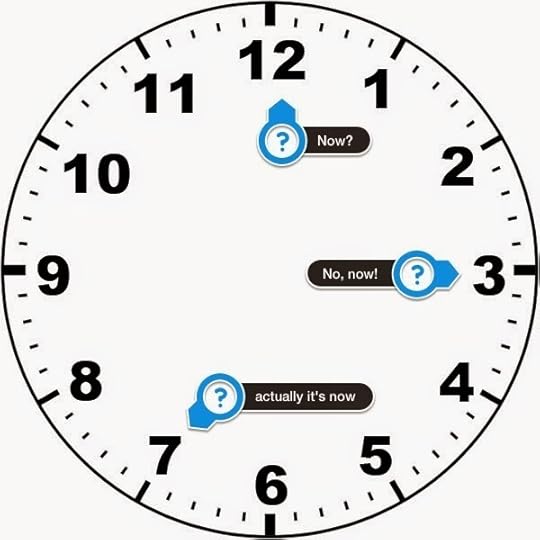 I came across a blog entry the other day that started with a quote from my
Build Your Own Time Machine
, then went on, as far as the author was concerned, to demolish my statement. (I'm afraid I've misplaced the URL, so can't link to it.)
I came across a blog entry the other day that started with a quote from my
Build Your Own Time Machine
, then went on, as far as the author was concerned, to demolish my statement. (I'm afraid I've misplaced the URL, so can't link to it.)The argument went something like this. What this book says (that time travel is possible) can't be true, because the past and the future don't exist. There's only the present. You can't travel to somewhere that doesn't exist. He was half right. We only experience one present ourselves, but it doesn't stop there being other versions of 'now' - that's the whole point of special relativity: we have to consider relative positions in spacetime, not just relative positions in space.
A simplistic counter to my critic's argument might be that we can see all sorts of other 'now's by looking up at the stars. We see the nearest star as it was something over four years ago, while telescopes let us peer billions of years into the past. But that wouldn't do the job. He could argue reasonably that we aren't seeing their 'now' but a record of their past, set in the aspic of the time it takes light to reach us. If there were inhabitants of a planet by one of those distant stars, they wouldn't be waiting for that light to get here - their 'now' would be moving on. Sort of.
So let's take a real, practical example of a device that has a different 'now' to us on the Earth that we can think about more realistically - a GPS satellite. When I talk about time travel to an audience I say how relatively (snigger) easy it is to travel forwards in time, but backwards is a whole different ballgame. What I really should say is that to travel usefully backwards is ridiculously difficult and quite possibly impractical. Because GPS satellites do travel backwards in time. (Before you get all excited about using one to win the lottery, this kind of backwards time travel wouldn't make that or time paradoxes possible.) And we know this, because the GPS system has to be corrected for it - if it weren't, your sat nav would go wrong by several kilometres a day.
There are two relativity effects on the satellite, which is essentially a very accurate clock, blasting out the time. Special relativity says that time on the satellite will run slow as seen from the Earth, because it is moving. General relativity, meanwhile, tells us that time will run quicker on the satellite than on Earth, because it is in a weaker gravitational field, and gravity slows time down. As it happens, general relativity wins and time on the satellites gets ahead of the Earth by about 0.000038 seconds a day.
Wait long enough, and time on the satellite would eventually be, say, a year ahead of time on Earth. Here's the part where my critic was right. Allowing for communications delay, both the Earth and the satellite would think there was only one 'now'. But the Earth would say that 'now' was 2014 (in some different numbering system, as it would be take many thousands of years for the satellite to get this far ahead) and the satellite would say it was 2015. And both would be right. If the satellite now came down to Earth, it would be travelling a year into the past. If you changed the scenario a bit, made the satellite big enough to have a city on and made the differential 100 years, the people of that city could have produced exciting new technologies in the time between 2014 and 2114. Whole new generations would be born. They would be visitors from the future when the they came down to Earth.
Wouldn't a satellite dweller know the next 100 years of Earth lottery results? No - because all she sees looking down is Earth in the past - those lotteries haven't happened yet. And what happened to the time paradoxes? To make them happen, you would have to travel from the Earth's 2114 to the Earth's 2014. But that hasn't happened. Imagine someone on the satellite was the grandson of someone on Earth, born in 2080 on the satellite. If they try the grandfather paradox and kill their grandfather back on Earth (who could be younger than they are), nothing would happen to the grandson. Because even though 2014 is 66 years before they were born, they had come from a different speed of time stream. There is no paradox.
So in a sense there is only one 'now'. But by moving to somewhere where time has run slower or quicker we can make that 'now' the future or the past. Mind boggling, it's true, but a lot more fun than the critic's insistence on a single present that is uniform across the universe.
Published on June 11, 2014 01:10
June 10, 2014
The decline of recycling
 I can think of better incentivesThe recent elections may not have shown a huge surge of Green voters a la Ukip, but there certainly are more of us taking the party seriously. So it's a bit of a shame that councils are having trouble with recycling.
I can think of better incentivesThe recent elections may not have shown a huge surge of Green voters a la Ukip, but there certainly are more of us taking the party seriously. So it's a bit of a shame that councils are having trouble with recycling.Until recently, recycling in the UK was on the rise, but now it is dropping. This is seen as a bad thing for two reasons. Recycling can result in a reduction in use of scarce materials - or a reduction in the need to dig big holes in the ground to produce them - and it cuts down on the phenomenal amount of stuff we send to landfill. But, to be honest, I'm not at all surprised that councils aren't succeeding, because it's a classic case of an intermediary being expected to spend money on something that doesn't benefit them directly. It's pretty well all stick and very little carrot for the councils.
I'd suggest there are five steps that could be undertaken to significantly increase recycling pretty well instantly.
Simplify sorting. At the moment, too many councils confuse the householder. What's needed to recycle would be to have four 'bins' - paper/card/fabric/wood (which you need to keep dry or it loses it is less effectively for recycling), hard stuff (glass, metal, plastic) and squishy stuff (green waste and food waste) - with hopefully very little left over as landfill. But, for instance, our council insists on plastic going in clear bin liners separate from the other recycling. Of course, the ideal from the user's viewpoint would be if you just had a bin everything went in, and it was recycled from there, but I can understand the difficulties if, for instance, paper gets covered in food waste.Don't charge for green waste. This is just bonkers - our council, along with many others, have started to charge extra for green waste. All this will do is result in green waste going in landfill or being dumped by the roadside.Incentivise recycling. There have been occasional attempts to charge people for the weight of their landfill. This gets things totally back to front. We should be paying people for recycling. The more stuff in the recycling (provided it's sorted correctly), the more cash you get back. We also should have walk-in recycling centres (not all car-based as they are now), where you get cash for bringing in, say, a bag full of bottles. When I was young we used to go hunting for discarded glass bottles, because you got a deposit back on them. If recycling centres paid for waste, we could see this kind of 'vigilante clean up squad' operation getting rid of litter.Don't have a one size fits all policy. One of the big problems councils face is that they all have the same targets, but for some, for instance, it is financially viable to recycle food waste, for others the cost is prohibitive. Similarly, near where I live, landfill is not as much an issue as it is elsewhere because we have a lot of big holes in the ground due to gravel extraction that need filling.Include electronic/electrical goods in the 'hard stuff' category. This is the most valuable of the recycling opportunities - and one that is legally required - yet most councils make it difficult, expecting you to take this stuff to a recycling centre. So the smaller stuff goes, technically illegally, into landfill. Make it easy to recycle and the council could reap real financial rewards. If it's too big to go in a recycling bin (TVs to washing machines), have free collection. If the council can't be bothered, it's time to have a modern equivalent of the rag and bone man of my youth, coming round picking up your electrical/electronic waste for free.Will this happen? Almost certainly not. Does it matter? Sort of. Recycling often makes commercial sense. Glass, for instance, is often recycled to be used in roadbeds. (Did you think it was turned back into a new glass bottle? Dream on.) That's good commercially, and means there is less need to dig gravel up, making fewer unsightly holes. In terms of 'saving the planet' (or rather 'saving the human ecostructure' - the planet doesn't need saving), the electronic stuff would have the most leverage, but bizarrely at the moment it is made hardest to recycle. It's worth recycling because it makes use of the most scarce (and hence expensive) materials. Otherwise, recycling's best benefit is it brings environmental concerns to our notice. It might not actually result in a lot of environmental good, but it keeps us aware. Which is even more reason to make it easy (and rewarding) to do.
This has been a green heretic production.
Published on June 10, 2014 00:56
June 9, 2014
How to irritate primary school teachers
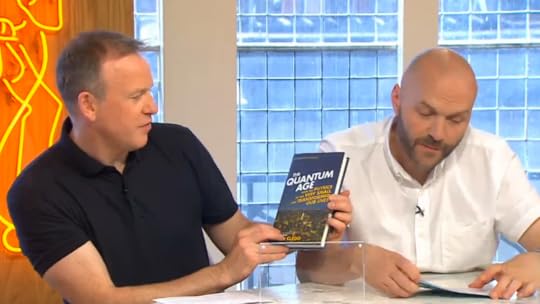 What a nice bookThis afternoon I'm giving a talk at a primary school in Chippenham, and I'm a little nervous. Not because of the talk itself - they always make a great audience - but in case the teachers throw things. Let me explain.
What a nice bookThis afternoon I'm giving a talk at a primary school in Chippenham, and I'm a little nervous. Not because of the talk itself - they always make a great audience - but in case the teachers throw things. Let me explain.Yesterday I had the great pleasure of taking part in the Channel 4 programme Sunday Brunch to talk about my new book The Quantum Age . It was a really enjoyable morning, and the segment appeared to be well received. But while I may have done pretty well on attempting to get people interested in quantum physics, I put my foot in it when it comes to junior school teachers.
We had discussed the way the current curriculum is essentially Victorian and I'd pointed out how it's not a problem of the subject, because I talk about quantum physics to junior school children and they lap up its weirdness with more easy acceptance than adults. What I then wanted to say was something like 'Unfortunately the curriculum doesn't make a mention of quantum theory, and the teachers don't receive any training to talk about it.' Let's be clear, the criticism was supposed to be very much of the science curriculum, not teachers. But what I actually said was something like 'Junior school teachers don't have a clue.'
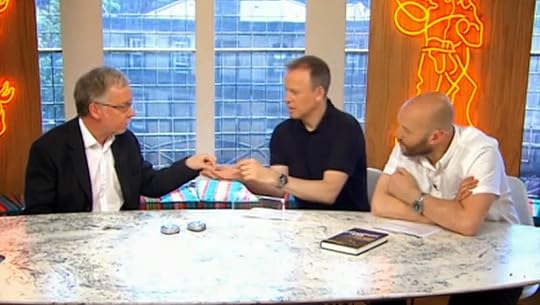 Anyone for a quantum coin trick?The moment I said it, my stomach dropped - but in this kind of high speed, live discussion, it's so easy to not say exactly what you mean. Taken in isolation it sounds terrible - but all that I intended was to say that the teachers don't have the preparation and the material to put across what is now one of the two fundamental aspects of physics, which is a real shame.
Anyone for a quantum coin trick?The moment I said it, my stomach dropped - but in this kind of high speed, live discussion, it's so easy to not say exactly what you mean. Taken in isolation it sounds terrible - but all that I intended was to say that the teachers don't have the preparation and the material to put across what is now one of the two fundamental aspects of physics, which is a real shame.I also ought to say that I now have a genuine sympathy for politicians and others who say something rather silly in a TV interview. When your brain is working double time, it can be very easy to lose track of exactly which words come out.
To finish on a lighter note, I was appearing on the same show as the Australian boy band Five Seconds of Summer, which meant that some of the tweets received during the show were not the usual things I'd expect. I leave you with this to contemplate:

Published on June 09, 2014 01:04
June 6, 2014
No more jobs for the boys?
I'm really glad to see there is some thought being put into getting less gender bias in particular types of career - notably science - led by Jenny Willott, the UK's Women and Equalities Minister.
There is certainly nowhere that this has been more obvious than in physics. To be fair, things are marginally better than they were in my day. This is my final degree year photo at the New Cavendish in Cambridge and out of that whole horde, I think there five or six women (it's difficult to tell, given the average hair length amongst the men at the time). But there is still a long way to go.
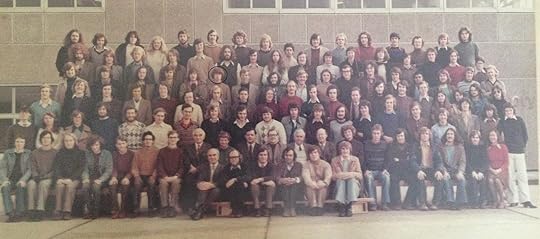 That's me, circled, for your amusementApparently a report by the IoP suggests that around half of state schools 'reinforce gender stereotypes' in terms of the subjects students study at A-level. The plan to sort this out is to send in young female scientists and engineers as role models.
That's me, circled, for your amusementApparently a report by the IoP suggests that around half of state schools 'reinforce gender stereotypes' in terms of the subjects students study at A-level. The plan to sort this out is to send in young female scientists and engineers as role models.
I have nothing against this plan - I like a good role model, but I think there should be a lot more effort put into the psychology of why these mindsets are created, because I am really not sure schools have a lot to do with it (or role models). All the evidence is that the biggest influence on teenagers is peer pressure, rather than anything adults do. How is this being addressed? How do you stop a teenage girl who wants to study science receiving mockery from her peers? We can go around in T-shirts proclaiming 'I'm a geek and proud of it', but how do we genuinely make it more acceptable to be into science?
The other big influencer, I'd suggest is youth culture. There's little point someone coming into schools if everything young women get from MTV and the other yoof channels, and magazines aimed at youth constantly push a particular kind of image that certainly has nothing to do with women in science. I doubt if she can do much about the peer pressure aspect - that has to come from young people themselves - but youth culture is definitely something Jenny Willott should be taking a look at influencing. Not by going all trying to make them go all worthy, but by addressing the remarkably conservative (with a small C) approach to gender roles that is taken by these outlets.
There is certainly nowhere that this has been more obvious than in physics. To be fair, things are marginally better than they were in my day. This is my final degree year photo at the New Cavendish in Cambridge and out of that whole horde, I think there five or six women (it's difficult to tell, given the average hair length amongst the men at the time). But there is still a long way to go.
 That's me, circled, for your amusementApparently a report by the IoP suggests that around half of state schools 'reinforce gender stereotypes' in terms of the subjects students study at A-level. The plan to sort this out is to send in young female scientists and engineers as role models.
That's me, circled, for your amusementApparently a report by the IoP suggests that around half of state schools 'reinforce gender stereotypes' in terms of the subjects students study at A-level. The plan to sort this out is to send in young female scientists and engineers as role models.I have nothing against this plan - I like a good role model, but I think there should be a lot more effort put into the psychology of why these mindsets are created, because I am really not sure schools have a lot to do with it (or role models). All the evidence is that the biggest influence on teenagers is peer pressure, rather than anything adults do. How is this being addressed? How do you stop a teenage girl who wants to study science receiving mockery from her peers? We can go around in T-shirts proclaiming 'I'm a geek and proud of it', but how do we genuinely make it more acceptable to be into science?
The other big influencer, I'd suggest is youth culture. There's little point someone coming into schools if everything young women get from MTV and the other yoof channels, and magazines aimed at youth constantly push a particular kind of image that certainly has nothing to do with women in science. I doubt if she can do much about the peer pressure aspect - that has to come from young people themselves - but youth culture is definitely something Jenny Willott should be taking a look at influencing. Not by going all trying to make them go all worthy, but by addressing the remarkably conservative (with a small C) approach to gender roles that is taken by these outlets.
Published on June 06, 2014 02:46



